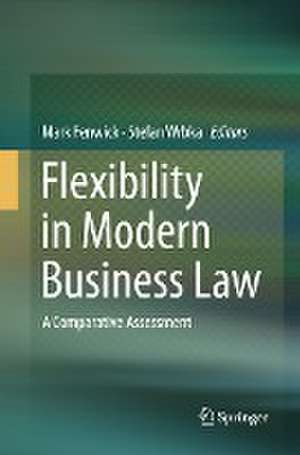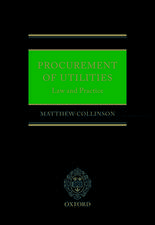Flexibility in Modern Business Law: A Comparative Assessment
Editat de Mark Fenwick, Stefan Wrbkaen Limba Engleză Paperback – 31 mar 2018
| Toate formatele și edițiile | Preț | Express |
|---|---|---|
| Paperback (1) | 624.71 lei 6-8 săpt. | |
| Springer – 31 mar 2018 | 624.71 lei 6-8 săpt. | |
| Hardback (1) | 630.83 lei 6-8 săpt. | |
| Springer – 17 ian 2016 | 630.83 lei 6-8 săpt. |
Preț: 624.71 lei
Preț vechi: 734.95 lei
-15% Nou
Puncte Express: 937
Preț estimativ în valută:
119.54€ • 126.24$ • 99.48£
119.54€ • 126.24$ • 99.48£
Carte tipărită la comandă
Livrare economică 13-27 ianuarie 25
Preluare comenzi: 021 569.72.76
Specificații
ISBN-13: 9784431566922
ISBN-10: 4431566929
Ilustrații: VII, 229 p.
Dimensiuni: 155 x 235 mm
Greutate: 0.34 kg
Ediția:Softcover reprint of the original 1st ed. 2016
Editura: Springer
Colecția Springer
Locul publicării:Tokyo, Japan
ISBN-10: 4431566929
Ilustrații: VII, 229 p.
Dimensiuni: 155 x 235 mm
Greutate: 0.34 kg
Ediția:Softcover reprint of the original 1st ed. 2016
Editura: Springer
Colecția Springer
Locul publicării:Tokyo, Japan
Cuprins
The Flexibility of Law & its Limits in Contemporary Business Regulation
(Mark Fenwick and Stefan Wrbka).- Part I – The Perspective of the Lawmaker.- The Potential and Limits of Teleological Reduction Shown with the Example of the Austrian Warranty Regime (Stefan Wrbka).- The Austrian Civil Law Company as an Example of a Successful Company (Daniele Mattiangeli and Lisa Katharina Promok) .- From the Boardroom to the Corner Store: Globalization, Law and Economic Organization (Sean McGinty).- The Novelist’s Artistic Freedom v. His Protagonist’s Rights of Personality – A Comparison between German and U.S.-American Law (Christian Gomille).- PartII – The Perspective of the Regulator.- Delayed Leniency Applications – The Unfortunate but Predictable Outcome of the Flexible Leniency Policies under the Chinese Antimonopoly Law (Steven Van Uytsel and Ying Bi).- Investor-State Arbitration: A Tale of Endless Obstacles? (Claudia Reith).- Part III – The Perspective of Business.- The New Corporate Criminal Law & Transnational Legal Risk (Mark Fenwick).- Consumer Credit Law in the European Union and Japan – A Comparative Study (Jarl Jacob).- 'Plan-like Architectures' for Mutual Trust in the Cloud (Marc
elo Corrales).- Subject Index.
(Mark Fenwick and Stefan Wrbka).- Part I – The Perspective of the Lawmaker.- The Potential and Limits of Teleological Reduction Shown with the Example of the Austrian Warranty Regime (Stefan Wrbka).- The Austrian Civil Law Company as an Example of a Successful Company (Daniele Mattiangeli and Lisa Katharina Promok) .- From the Boardroom to the Corner Store: Globalization, Law and Economic Organization (Sean McGinty).- The Novelist’s Artistic Freedom v. His Protagonist’s Rights of Personality – A Comparison between German and U.S.-American Law (Christian Gomille).- PartII – The Perspective of the Regulator.- Delayed Leniency Applications – The Unfortunate but Predictable Outcome of the Flexible Leniency Policies under the Chinese Antimonopoly Law (Steven Van Uytsel and Ying Bi).- Investor-State Arbitration: A Tale of Endless Obstacles? (Claudia Reith).- Part III – The Perspective of Business.- The New Corporate Criminal Law & Transnational Legal Risk (Mark Fenwick).- Consumer Credit Law in the European Union and Japan – A Comparative Study (Jarl Jacob).- 'Plan-like Architectures' for Mutual Trust in the Cloud (Marc
elo Corrales).- Subject Index.
Notă biografică
Mark Fenwick Associate Professor, Faculty of Law, Kyushu University, Japan
Stefan Wrbka Associate Professor, Faculty of Law, Kyushu University, Japan
Stefan Wrbka Associate Professor, Faculty of Law, Kyushu University, Japan
Textul de pe ultima copertă
This book brings together a number of contributions examining how changes associated with economic globalization have contributed to the creation of new pressures on, and expectations of, those fields of law connected to the regulation of cross-border commercial transactions. These new demands of law – in particular, that it be more agile or “flexible” in regulating the economy – have prompted lawmakers and regulators in multiple jurisdictions to adopt a range of new regulatory techniques and legal forms to respond to this challenge. In many cases, these adaptations in law have entailed compromising traditional legal principles, such as legal certainty, in favor of empowering regulators with greater discretion than has traditionally been permitted in modern law. This change raises important questions about the meaning of fairness (certainty or flexibility), as well as the relationship between the public and private good.
Caracteristici
Presents a theoretically informed examination of tension between demand for legal certainty and flexibility in regulating transnational business Discusses various fields of law relevant to contemporary business law, including civil law, corporate law, competition law, and IP law Includes diverse perspectives on the challenges of regulating commercial transactions in a global economy









